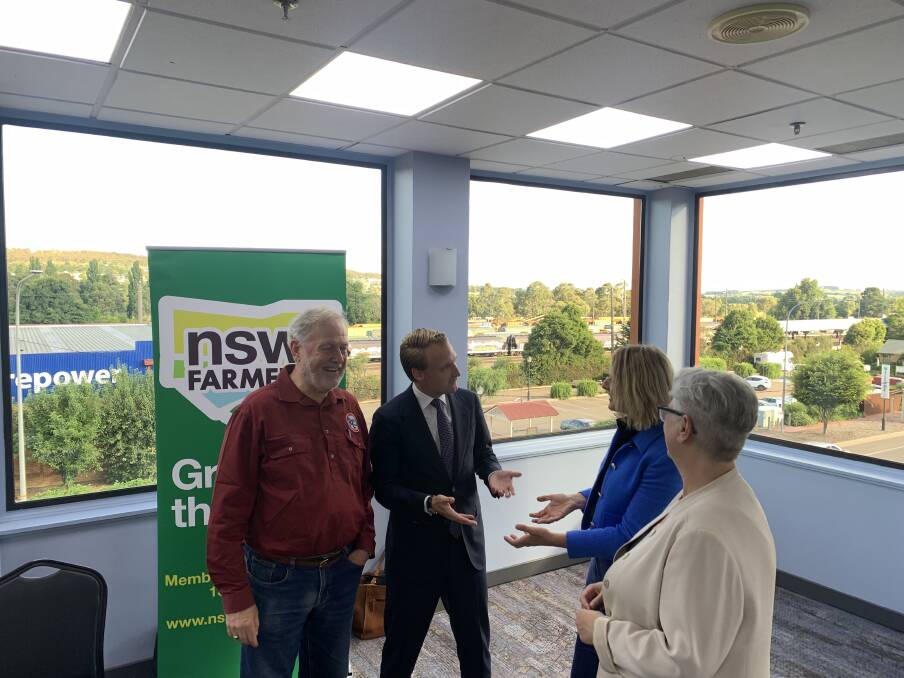
More government boots on the ground to build "proper" relationships with farmers and engaging our younger generation on environmental issues impacting agriculture were raised at the first NSW Farmers' election forum.
Subscribe now for unlimited access to all our agricultural news
across the nation
$0/
(min cost $0)
or signup to continue reading
While Greens spokeswoman for environment Sue Higginson highlighted the issue, it was the sentiment of all panelists including Environment Minister James Griffin, Shadow Environment Minister Penny Sharpe and Shooters Fishers and Farmers spokesperson Robert Borsak.
Ms Higginson, who declared she was the only farmer on the panel as a cropper - with her husband in the Northern Rivers - said: "the role of government with us on the land is to make a proper partnership with us and really understand what it is we do".
She spoke about getting "smashed" by floods in her region that came just after extinguishing fires in the world heritage parks.
"We know the challenges of climate change, we know that as farmers on the land we face more extreme weather events that impact our business," she said.
She said in the past 12 years farmers had been neglected with a focus on resources extraction and agribusiness.
Later she added there was a need to look at how to engage young people in environmental space who were rarely present in this space.
Mr Griffin, who outlined current government environmental programs as well as the review of Biodiversity Conservation act, added: "When people get together we can solve some of the most significant environment challenges we face."
Ms Sharpe said one of the biggest challenges was invasive weeds and pests in which Labor had promised a biosecurity commissioner to help solve the problem.
"I know how many of you are frustrated that you clean up weeds and pest on your own properties but you are seeing weeds and pest everywhere whether they are on railway lines or national parks or state forests," she said.
Mr Borsak said there was a lack of support for farmers impacted by extreme weather events and access to reliable water in his opening speech.
"Government regulations and policies that are currently in place are having a detrimental impact on our farmers in NSW. We need policies that are tailored to the unique circumstances of NSW farmers."
Panelists were asked how could they ensure farmer's need for diesel did not leave them punished when it came to the push for electronic vehicles in NSW.
Ms Higginson hoped the federal government was looking at this and embracing the reality that this was where "we were heading".
"We need more transparency on how to get there and we need to invest in innovation," she said. "We need some leadership."
Mr Borsak said electric vehicles would be fine to drive in Sydney but when it came to travelling around NSW to Nyngan or Broken Hill it would not be reliable enough.
He added there was a need for a reliable diesel supply to make sure farmers could do their job.
Mr Griffin said the government was working with NRMA and it was building charging infrastructure across regional and rural NSW as quickly as it could.
Meanwhile Ms Sharp said there was a big gap in the public sector with not enough public servants on the ground working with farmers.
"There are not enough people on the ground," she said. "There aren't enough people to do what public servants are asked to do ... often farmers only see public servant for compliance activity rather than long-term partnership."
While Mr Borsak raised issue about what Landcare was going to do after the election with no guaranteed funding, the very same question was raised by a Landcare member at the forum.
Mr Griffin, who pointed out he had a hand-delivered funding request from Landcare in front of him, said Landcare was a valued partner in which the government had allocated $22.4 million between 2019 and 2023 to fund programs and coordinators.
Ms Sharpe said Labor was looking at a longer funding agreement of five years. Other issues raised included recycling solar panels and transmission lines.
NSW Farmers' head of policy and advocacy Annabel Johnson said finding the right balance between agricultural productivity and environmental outcomes would be important in the next term of government.
"We want to hear from all sides of politics regarding the important issue of the environment," Ms Johnson said.
"As land managers, farmers have a critical role in environmental conservation; but historically, farmers have faced a changing landscape of confusing legislation and environmental targets.
"Environmental conservation is incredibly important, but food certainty is another important objective and the two are not mutually exclusive; it's all about finding balance."
Polling commissioned by NSW Farmers revealed the number one issue for voters was the cost of living with high food and grocery costs likely to make an impact at the ballot box.
Ms Johnson said savvy politicians would be finding ways to secure food production in NSW, and this meant getting the balance right on the environment.
"Farmers grow healthy plants and healthy animals to make the food and fibre we all need, and we have seen the pain that supply chain disruptions can cause for people," Ms Johnson said.
"The message we are getting out to decision-makers and voters is that investing in agriculture now will save a lot of stress down the road, whether it's better road and rail infrastructure, stronger biosecurity, more research and development, clear workforce strategies, or effective land use planning.
"We want to highlight that in order to keep food affordable, we need a sustainable and functioning agriculture sector."
Future regional debate
- Water, February 1 at Bega
- Regional NSW, February 14 TBC
- Infrastructure, February 15 at Muswellbrook
- Agriculture, February 22 at Dubbo
- Energy and land use, March 1 at Wagga Wagga
Subscribers have access to download our free app today from the App Store or Google Play


